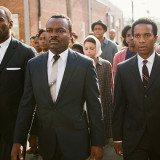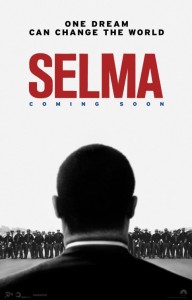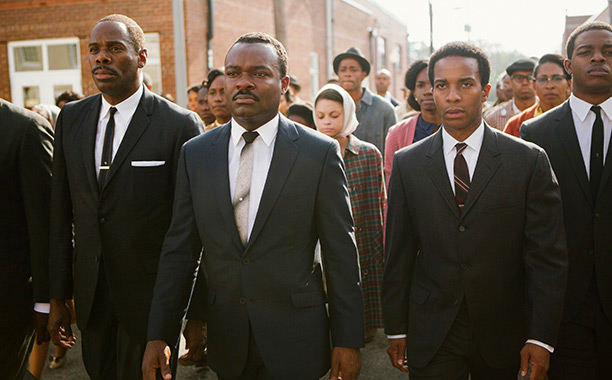
Movie Review: Selma
What We Liked
What We Didn't Like
Ever since standing inside a frozen moment at the Lorraine Motel in Memphis – looking across to where the bullet must have issued, taking the life of an icon of nonviolent resistance – the image of Dr. Martin Luther King has become something more intimate to me. Black and white schoolroom footage becomes flesh, the voices less distant, when you stare into the full horizon of the cultural landscape that fought against basic life rights for African Americans in the South and those who began to turn the tide. Ava DuVernay’s Selma takes us to that headspace, shows us the familiar under new lights, ruminates on American history without histrionics.

At the center of it, King (David Oyelowo) is portrayed as a man with the spiritual fire and political savvy to continue his work under close government scrutiny and constant white supremacist threats. Intrusive onscreen text makes note of actual documented FBI wiretaps throughout the movie: useful references for the storyteller that have the effect of drawing us back into the larger historical ramifications of these domestic conversations between spouses or confidants. Or, most heartbreakingly: Martin calling Mahalia Jackson to sing him some heavenly serenity while Gov. George Wallace (Tim Roth, spluttering and vile) organizes his redneck army to battle the peace marches (he ordered every adult white man be deputized in the race war).
In a restrained embodiment by Oyelowo, Dr. King comes down from the pulpit, measuring his mission against the cost of lives lost. That stentorian cadence that voiced a mass movement drops to a self-doubting register in conference with other members of the SCLC, in particular Director James Bevel (Common) and wife Coretta (Carmen Ejogo). More pointed are King’s Oval Office meetings with President Johnson (Tom Wilkinson). Oppressed even by the intense white light pouring through every window, King is framed hard against the right side of the picture, negotiating with little room to breathe or speak. The same shot appears in a voting registration scene with similar effect. Throughout, DuVernay reserves the “hero” shots, preferring subtler staging and un-distanced camera.

Colman Domingo, David Oyelowo, André Holland, and Stephan James in “Selma.” Photo by Photo credit: Atsushi Nishijima – © 2014 Paramount Pictures. All Rights Reserved.
Malcolm X appears briefly, counsels with Coretta, two weeks later he is assassinated off-screen; DuVernay keeps the revolution’s focus tight on the Selma campaign, taking stock of the ways tensions build and erupt. The murder of Jimmie Lee Jackson by a state trooper is filmed with devastating emotion and the beats of a thriller. The actual Jackson took a week to die from the bullets; DuVernay and writer Paul Webb are more dramatically blunt (and resonant) in the telling of this and other key incidents.
There is not enough time to delve into the greater complexities of these immortalized figures and events – King and his cause are too grandiose and complex to fit into this framework. Selma gracefully finds a way to satisfy history, the participants, and legacies while both attempting to see it all for the first time and leave something more abstract and philosophical for our present unrest.

Gregory Fichter

Latest posts by Gregory Fichter (see all)
- Bela Lugosi’s Not Really Dead: A Vampire Movie Primer - November 18, 2011
- Ten Great Summer Grindhouse Movies - August 16, 2011
- The Ten Best Johnny Depp Movies - May 19, 2011


